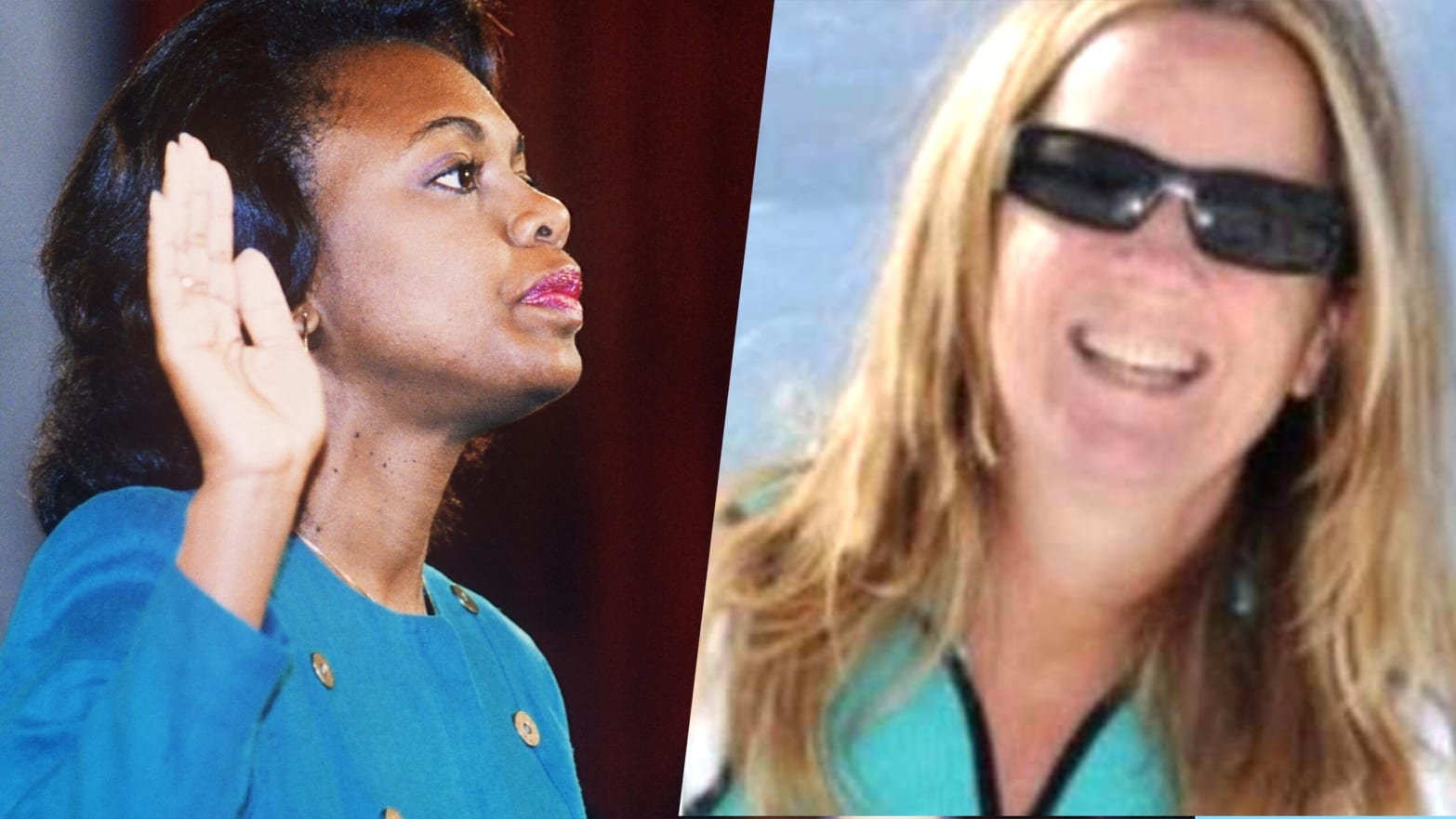When Anita Hill testified before an all-male and all-white Senate Judiciary committee in 1991, no one was in her corner—not the country, not the lawmakers grilling her, and certainly not history.
Sexual harassment was a new term, and the senators, Republicans and Democrats alike, would have preferred to silence her and go ahead with their important work confirming a Supreme Court justice without hearing her unsavory and unproven allegations against Clarence Thomas, an African-American nominee and the protege of then Republican Senator John Danforth, an ordained Episcopal priest.
The playing field was heavily tilted in Thomas’ favor when Republican Senator Orrin Hatch, the ranking member on the Judiciary committee then and still there 27 years later, memorably floated the theory that Hill’s testimony about Thomas asking in the workplace they shared, “Who put a pubic hair on my coke?” was something “contrived” that Hill had borrowed from the 1971 novel, The Exorcist.”
Hatch said Hill was working with “slick lawyers” and interest groups bent on destroying Thomas, that she was delusional, suffering from what Republicans termed “erotomania.”
The echoes of the Hill-Thomas hearings reverberate as the Senate again grapples with last minute accusations of sexual wrongdoing against a Republican nominee to the high court.
Judging from Hatch’s initial response, he hasn’t changed that much in the last three decades, declaring after a phone call with Brett Kavanaugh and no further evidence that Christine Blasey Ford, a 51-year-old research psychologist, must have been “mixed up” in identifying Kavanaugh as the teenage boy who tried to force himself on her at a drunken party when he was 17 and she was 15, covering her mouth to suppress her screams.
Hatch’s reaction is almost laughable, he is so out of step with the times. He will discover it’s not so easy to dismiss Ford, who holds a doctorate and is addressed as Dr. Ford. When Hill came forward, also reluctantly, the burden of proof was entirely on her, and a poll taken after her testimony, and after Thomas’ rebuttal, showed that people overwhelmingly believed Thomas (58 percent to 24).
Democrats controlled the Senate then, and Joe Biden chaired the Judiciary committee. In his 1992 book, Advice and Consent, Democratic Senator Paul Simon, a member of the committee, said that Biden counseled at the outset of Hill’s testimony that Thomas should have the benefit of the doubt, which meant that senators unpersuaded either way, who couldn’t definitively decide who was telling the truth, should decide on the assumption that Thomas was telling the truth and not Hill.
The Democrats under Biden’s leadership didn’t fully investigate Hill’s allegation, and didn’t allow corroborating witnesses to testify. Three women were waiting to be called when Biden ended the hearing. Thomas was confirmed with 52 votes, a bare majority that included 41 Republicans and 11 Democrats. Biden and the. Democratic leadership chose not to filibuster the nomination, which would have required a 60-vote threshold for confirmation.
Biden has tried to make amends over the years for the way Hill was treated, and to explain his reasons for letting the confirmation proceed with a majority vote. If he runs for president in 2020, he will have more explaining to do.
The burden of proof has shifted in the MeToo era, and that is the most significant difference between the political environment Hill faced and the one that Ford will face. She starts from a place where more people are inclined to believe her. “Unlike with Anita Hill, the presumption lies with her, that she is believable,” says Nan Aron, founder and president of Alliance for Justice, a liberal advocacy group.
When a second allegation of sexual misconduct surfaced over the weekend from one of Kavanaugh’s classmates at Yale, Deborah Ramirez, Aron said the account of a drunken Kavanaugh exposing himself to Ramirez at a party “bolsters the credibility” of Ford’s story.
Other women’s stories may be coming out as well, substantiating Ford’s account about the alcohol-fueled misogynistic environment at these elite schools, and fueling outrage among women about sexual harassment and assault.
“The senate will be under enormous pressure to get it right this time,” Aron told the Daily Beast. “The MeToo movement is a seismic shift. If the hearing happens and when she (Ford) testifies, she at least will know she has the support of millions of people around the country.”
Marcia Greenberger, founder of the National Women’s Law Center, said she’s been “ricocheting between 27 years ago and today” since the news broke about Kavanaugh.
“You can’t sit back and expect the system to operate fairly,” she says, a lesson as true today as it was when she was present in the senate hearing room in 1991. It took a group of Democratic women, members of the House, to storm the Capitol steps and demand a hearing into Hill’s allegations before Biden and Hatch, the chairman and ranking member, agreed to proceed.
“Democrats on the panel saw themselves as neutral fact-finders while the Republicans operated as defenders of Thomas and prosecutors of Hill,” says Greenberger, “and none of the Democrats came forward as defenders of her.”
If there is a hearing this week with only Ford and Kavanaugh present, a similar dynamic is likely to occur with the Republicans cheerleading for Kavanaugh, and pressing Ford themselves or through a proxy while the Democrats under enormous pressure from their base try to figure out their role. “So how do you conduct a fair hearing?” Greenberger asks.
The second problem with the process both then and now is the arbitrary time frame. Biden as the chairman of the committee in ’91 was operating within a commitment he made to Hatch, the ranking Republican, to move the process along and resolve the matter quickly since Hill had come forward publicly after the scheduled hearings had concluded.
The Republican majority today is acting even more urgently to seat Kavanaugh on the Court when the new term begins in October, to ram him through before the midterms when they could lose control of the Senate. Republicans don’t want a full FBI investigation, and they don’t want to call corroborating witnesses, especially not Kavanaugh’s friend, Mark Judge, who Ford says was in the bedroom when the alleged incident occurred in the early eighties.
We see play out today the same refusal to allow expert witnesses to testify and answer the same question being asked today as it was then: Why did she wait so long to talk about it? There are answers to that question and many others as the Senate and the country grapple with the breadth and depth and scope of sexual misconduct and assault in a cultural moment that is at once less forgiving and yet remains ill-equipped to judge.

